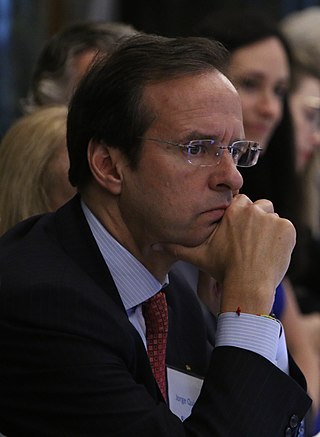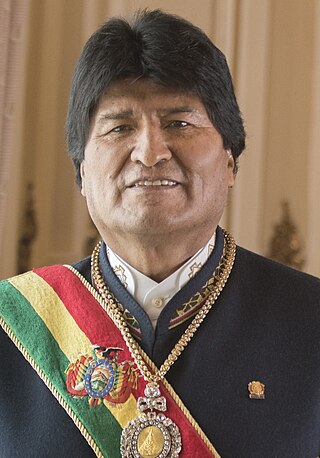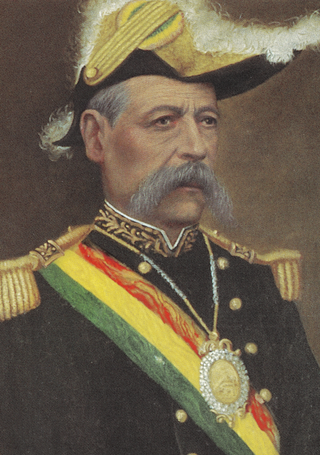Hernán Siles Zuazo was inaugurated on 10 October 1982 and formed his cabinet.
The High Command of the Military of Bolivia entrusted General Guido Vildoso Calderón with the Presidency on 21 July 1982, and he formed his cabinet.
The High Command of the Military of Bolivia entrusted General Celso Torrelio Villa with the Presidency on 4 September 1981, and on 7 September 1981 he formed his cabinet.
The High Command of the Military of Bolivia entrusted General Luis García Meza Tejada with the Presidency on 18 July 1980, and he formed his cabinet.
Lidia Gueiler Tejada was inaugurated on 16 November 1979 as Provisional President of Bolivia and formed her cabinet on 19 November 1979.
In Bolivia on 1 November 1979, Colonel Alberto Natusch Busch executed a coup d'état against the constitutional government of Wálter Guevara Arze, and formed his cabinet.
Wálter Guevara Arze was inaugurated on 8 August 1979 as Provisional President of Bolivia and formed his cabinet on 9 August 1979.
General David Padilla Arancibia had taken the Presidency 24 November 1978, and formed his cabinet.
General Juan Pereda Asbún assumed the presidency of Bolivia on 21 July 1978, formed his cabinet on 24 July and was removed from office on 3 November.
General Hugo Banzer Suárez took the Presidency of Bolivia on 21 August 1971 and formed his cabinet.
General Juan José Torres had taken the Presidency 7 October 1970, and formed his cabinet.

The Ministry of Cultures, Decolonization, and Depatriarchalization is the ministry of the government of Bolivia that provides for the preservation and protection of the cultures and artistic expressions of the indigenous peoples of Bolivia as well as promotes the country's tourism sector and process of decolonization and depatriarchalization.

Jorge Quiroga assumed office as the 62nd President of Bolivia on 7 August 2001, and his term ended on 6 August 2002. Having previously served as vice president, Quiroga assumed the presidency after the resignation for health reasons by President Hugo Banzer and was tasked with fulfilling the final 364 days of Banzer's term.

Enrique Hertzog assumed office as the 42nd president of Bolivia on 10 March 1947, and his term ended upon his resignation on 22 October 1949. A physician who served in various ministerial positions since the 1920s, Hertzog was elected as the head of the Republican Socialist Unity Party (PURS) ticket in the 1947 general elections.
The Ministry of Government is a ministry of the Plurinational States of Bolivia. It is tasked with regulating public policy. The current Minister of Government is Eduardo del Castillo since 9 November 2020.

The cabinet of Jeanine Áñez constituted the 220th and 221st cabinets of the Plurinational State of Bolivia. It was initially formed on 13 November 2019, a day after Jeanine Áñez was sworn-in as the 66th president of Bolivia following the 2019 political crisis, in which the ruling Movement for Socialism government resigned. A second cabinet was formed on 28 January 2020 with all but three ministers being ratified in their positions.

The Cabinet of Evo Morales constituted the 210th to 220th cabinets of the Plurinational State of Bolivia. It was initially formed on 23 January 2006, a day after Evo Morales was sworn-in as the 65th president of Bolivia.

Luis Paz Arce was a Bolivian historian, journalist, jurist, lawyer, and politician who served on the Supreme Court of Justice of Bolivia for twenty-three years, an associate justice from 1905 to 1919 and as the president from 1919 until his death in 1928. A conservative, Paz held a lengthy political and academic background, serving in various legislative and ministerial positions from the early 1880s to the mid-1890s, including as minister of war from 1895 to 1896, minister of government from 1892 to 1895, and senator for Tarija from 1892 to 1898. In 1921, the National Convention selected him to be vice president under Bautista Saavedra, but he rejected the position, preferring to remain on the High Court.

The Campero Cabinet constituted the 39th to 41st cabinets of the Republic of Bolivia. It was formed on 20 June 1880, five months after Narciso Campero was installed as the 20th president of Bolivia following the War of the Pacific, succeeding the Daza Cabinet. It was dissolved on 4 September 1884 upon the end of Campero’s term and was succeeded by the Cabinet of Gregorio Pacheco.
This page is based on this
Wikipedia article Text is available under the
CC BY-SA 4.0 license; additional terms may apply.
Images, videos and audio are available under their respective licenses.






